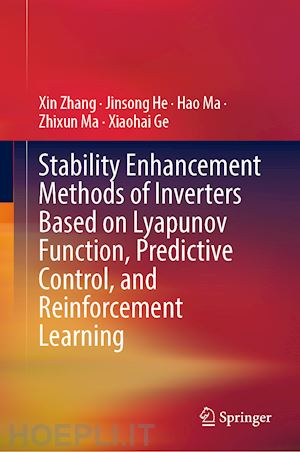
Questo prodotto usufruisce delle SPEDIZIONI GRATIS
selezionando l'opzione Corriere Veloce in fase di ordine.
Pagabile anche con Carta della cultura giovani e del merito, 18App Bonus Cultura e Carta del Docente
This book introduces a family of large-signal stability-based control methods for different power inverters (grid-connected inverter, standalone inverter, single-phase inverter, and three-phase inverter) in practical applications. Power inverters have stability issues, which include the inverter's own instability as well as the inverter's instability in relation to the other power electronic devices in the system (i.e., weak grid and the EMI filter). Most of the stability analyses and solutions are based on small-signal stability technology. Unfortunately, in actuality, the majority of practical instability concerns in power inverter systems are large-signal stability problems, which, when compared to small-signal stability problems, can cause substantial damage to electrical equipment.
As a result, researchers must conduct a comprehensive investigation of the large-signal stability challenge and solutions for power inverters. This book can be used as a reference for researchers, power inverters manufacturers, and end-users. As a result, the book will not become obsolete in the near future, regardless of technology advancements.
Xin Zhang received the Ph.D. degree in Automatic Control and Systems Engineering from the University of Sheffield, U.K., in 2016 and the Ph.D. degree in Electronic and Electrical Engineering from Nanjing University of Aeronautics and Astronautics, China, in 2014. From February 2014 to December 2016, he was Research Associate with the University of Sheffield. From January 2017 to September 2017, he was Postdoctoral Research Fellow at the City University of Hong Kong. From September 2017 to August 2020, he was Assistant Professor of Power Engineering with the School of Electrical and Electronic Engineering, Nanyang Technological University, Singapore. Currently, he is Full Professor at Zhejiang University. He is generally interested in power electronics, power systems, and advanced control theory, together with their applications in various sectors. He has received the Highly Prestigious Chinese National Award for Outstanding Students Aboard in 2016. He is Associate Editor of 8SCI journals and transactions, such as IEEE TIE/JESTPE/OJPE Access and IET Power Electronics.
He Jinsong received the B.Eng. degree in Electrical Engineering and its automation from Wuhan University, China, in 2018 and the Ph.D. degree in Electrical and Electronic Engineering from Nanyang Technological University (NTU), Singapore, in 2022. He was International Undergraduate Exchange Student from 2017 to 2018 at NTU's Clean Energy Research Lab. He is with the Power Dispatching and Control Center of China Southern Power Grid, China. He has been IEEE Student Member since 2018. He is interested in the stability analysis of power converters, microgrids, power dispatch, and control. He has published about 20 journal/conference papers in these areas.
Prof. Ma Hao received the B.S., M.S., and Ph.D. degrees from Zhejiang University, Hangzhou, China, in 1991, 1994, and 1997, respectively, all in Electrical Engineering. Since 1997, he worked as Lecturer, Associate Professor, and Professor at Zhejiang University. Currently, he is Professor in the College of Electrical Engineering and served as Vice Dean of ZJU-UIUC Institute, Zhejiang University. His research interests include advanced control in power electronics, wireless power transfer, fault diagnosis of power electronic circuits and systems, and application of power electronics.
Prof. Ma served as Director of Academic Committee of China Power Supply Society, Vice President, and Secretary-General of Power Supply Society of Zhejiang Province, Associate Editor of Journal of Power Electronics (JPE), Associate Editor of IEEE Journal of Emerging and Selected Topics in Power Electronics (JESTPE). He served as Vice Dean of College of Electrical Engineering, Zhejiang University (2013–2017), AdCom Member of IEEE Industrial Electronics Society (2014–2015), Technical Program Chair of IEEE PEAC 2018 and IEEE PEAC 2014, Technical Program Chair of IEEE ISIE 2012 and served as Co-chair of Power Systems and Smart Grids, IEEE IECON 2018, Special Session Co-chair of IEEE IECON 2017, Co-chair of Power Electronics and Energy Conversion, IEEE IECON 2013, and Co-chair of Power Electronics and Renewable Energy Track, IEEE IECON 2010.
Ma Zhixun received the B.S. and M.S. degrees in Electrical Engineering from China University of Mining and Technology, Xuzhou, China, and the Ph.D. degree in Electrical Engineering from Technical University of Munich, Germany, in 2006, 2009, and 2014, respectively. He is Associate Professor at National Maglev Transportation Engineering R&D Center, Tongji University, Shanghai, China. He was also Research Fellow at Nanyang Technological University, Singapore. He is Member of the IEEE society. His main research areas include predictive control and sensorless control of electrical drives, renewable energy systems, and FPGA-based digital control of power electronics and drive systems.
Ge Xiaohai received B.S. and M.S. degrees in Electrical Engineering from Central South University, Changsha, China, in 2017 and 2020, respectively. From June 2021 to August 2022, he worked as an electrical engineer at the Hangzhou Global Scientific and Technological Innovation Center of Zhejiang University, Hangzhou, China. Currently, he is working toward the Ph.D. degree in Technology of Energy and Power at Zhejiang University, Hangzhou, China. He has been IEEE Student Member since 2021. His main research areas include advanced control, protection, and stabilization technologies of power converters, renewable energy systems, and microgrids.











Il sito utilizza cookie ed altri strumenti di tracciamento che raccolgono informazioni dal dispositivo dell’utente. Oltre ai cookie tecnici ed analitici aggregati, strettamente necessari per il funzionamento di questo sito web, previo consenso dell’utente possono essere installati cookie di profilazione e marketing e cookie dei social media. Cliccando su “Accetto tutti i cookie” saranno attivate tutte le categorie di cookie. Per accettare solo deterninate categorie di cookie, cliccare invece su “Impostazioni cookie”. Chiudendo il banner o continuando a navigare saranno installati solo cookie tecnici. Per maggiori dettagli, consultare la Cookie Policy.